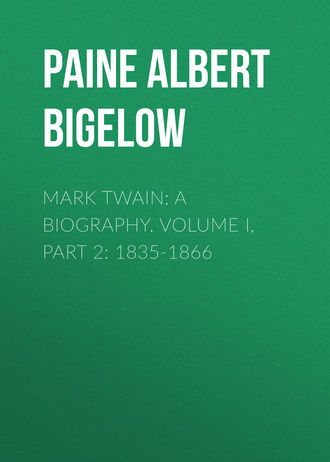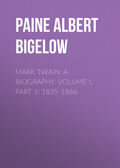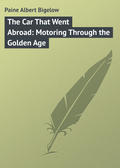
Paine Albert Bigelow
Mark Twain: A Biography. Volume I, Part 2: 1835-1866
LXXVII
THE "GALAXY"
Mark Twain's work on the Express represented only a portion of his literary activities during his Buffalo residence. The Galaxy, an ambitious New York magazine of that day—[published by Sheldon & Co. at 498 and 500 Broadway]—proposed to him that he conduct for them a humorous department. They would pay $2,400 a year for the work, and allow him a free hand. There was some discussion as to book rights, but the arrangement was concluded, and his first instalment, under the general title of "Memoranda," appeared in the May number, 1870. In his Introductory he outlined what the reader might expect, such as "exhaustive statistical tables," "Patent Office reports," and "complete instructions about farming, even from the grafting of the seed to the harrowing of the matured crops." He declared that he would throw a pathos into the subject of agriculture that would surprise and delight the world. He added that the "Memoranda" was not necessarily a humorous department.
I would not conduct an exclusively and professedly humorous department for any one. I would always prefer to have the privilege of printing a serious and sensible remark, in case one occurred to me, without the reader's feeling obliged to consider himself outraged…. Puns cannot be allowed a place in this department…. No circumstance, however dismal, will ever be considered a sufficient excuse for the admission of that last and saddest evidence of intellectual poverty, the pun.
The Galaxy was really a fine magazine, with the best contributors obtainable; among them Justin McCarthy, S. M. B. Piatt, Richard Grant White, and many others well known in that day, with names that still flicker here and there in its literary twilight. The new department appealed to Clemens, and very soon he was writing most of his sketches for it. They were better literature, as a rule, than those published in his own paper.
The first number of the "Memoranda" was fairly representative of those that followed it. "The Facts in the Case of the Great Beef Contract," a manuscript which he had undertaken three years before and mislaid, was its initial contribution. Besides the "Beef Contract," there was a tribute to George Wakeman, a well-known journalist of those days; a stricture on the Rev. T. DeWitt Talmage, who had delivered from the pulpit an argument against workingmen occupying pews in fashionable churches; a presentment of the Chinese situation in San Francisco, depicting the cruel treatment of the Celestial immigrant; a burlesque of the Sunday-school "good little boy" story,—["The Story of the Good Little Boy Who Did Not Prosper" and the "Beef Contract" are included in Sketches New and Old; also the Chinese sketch, under the title, "Disgraceful Persecution of a Boy."]—and several shorter skits—and anecdotes, ten pages in all; a rather generous contract.
Mark Twain's comment on Talmage was prompted by an article in which Talmage had assumed the premise that if workingmen attended the churches it would drive the better class of worshipers away. Among other things he said:
I have a good Christian friend who, if he sat in the front pew in church, and a workingman should enter the door at the other end, would smell him instantly. My friend is not to blame for the sensitiveness of his nose, any more than you would flog a pointer for being keener on the scent than a stupid watch-dog. The fact is, if you had all the churches free, by reason of the mixing of the common people with the uncommon, you would keep one-half of Christendom sick at their stomach. If you are going to kill the church thus with bad smells I will have nothing to do with this work of evangelization.
Commenting on this Mark Twain said—well, he said a good deal more than we have room for here, but a portion of his closing paragraphs is worth preserving. He compares the Reverend Mr. Talmage with the early disciples of Christ—Paul and Peter and the others; or, rather, he contrasts him with them.
They healed the very beggars, and held intercourse with people of a villainous odor every day. If the subject of these remarks had been chosen among the original Twelve Apostles he would not have associated with the rest, because he could not have stood the fishy smell of some of his comrades who came from around the Sea of Galilee. He would have resigned his commission with some such remark as he makes in the extract quoted above: "Master, if thou art going to kill the church thus with bad smells I will have nothing to do with this work of evangelization." He is a disciple, and makes that remark to the Master; the only difference is that he makes it in the nineteenth instead of the first century.
Talmage was immensely popular at this time, and Mark Twain's open attack on him must have shocked a good many Galaxy readers, as perhaps his article on the Chinese cruelties offended the citizens of San Francisco. It did not matter. He was not likely to worry over the friends he would lose because of any stand taken for human justice. Lamed said of him: "He was very far from being one who tried in any way to make himself popular." Certainly he never made any such attempt at the expense of his convictions.
The first Galaxy instalment was a sort of platform of principles for the campaign that was to follow. Not that each month's contribution contained personal criticism, or a defense of the Chinese (of whom he was always the champion as long as he lived), but a good many of them did. In the October number he began a series of letters under the general title of "Goldsmith's Friend Abroad Again," supposed to have been written by a Chinese immigrant in San Francisco, detailing his experience there. In a note the author says: "No experience is set down in the following letters which had to be invented. Fancy is not needed to give variety to the history of the Chinaman's sojourn in America. Plain fact is amply sufficient." The letters show how the supposed Chinese writer of them had set out for America, believing it to be a land whose government was based on the principle that all men are created equal, and treated accordingly; how, upon arriving in San Francisco, he was kicked and bruised and beaten, and set upon by dogs, flung into jail, tried and condemned without witnesses, his own race not being allowed to testify against Americans—Irish-Americans—in the San Francisco court. They are scathing, powerful letters, and one cannot read them, even in this day of improved conditions, without feeling the hot waves of resentment and indignation which Mark Twain must have felt when he penned them.
Reverend Mr. Talmage was not the only divine to receive attention in the "Memoranda." The Reverend Mr. Sabine, of New York, who had declined to hold a church burial service for the old actor, George Holland, came in for the most caustic as well as the most artistic stricture of the entire series. It deserves preservation to-day, not only for its literary value, but because no finer defense of the drama, no more searching sermon on self-righteousness, has ever been put into concrete form. —["The Indignity Put Upon the Remains of Gorge Holland by the Rev. Mr. Sabine"; Galaxy for February, 1871. The reader will find it complete under Appendix J, at the end of last volume.]
The "Little Church Around the Corner" on Twenty-ninth Street received that happy title from this incident.
"There is a little church around the corner that will, perhaps, permit the service," Mr. Sabine had said to Holland's friends.
The little church did permit the service, and there was conferred upon it the new name, which it still bears. It has sheltered a long line of actor folk and their friends since then, earning thereby reverence, gratitude, and immortal memory.—[Church of the Transfiguration. Memorial services were held there for Joseph Jefferson; and a memorial window, by John La Farge, has been placed there in memory of Edwin Booth.]
Of the Galaxy contributions a number are preserved in Sketches New and Old. "How I Edited an Agricultural Paper" is one of the best of these —an excellent example of Mark Twain's more extravagant style of humor. It is perennially delightful; in France it has been dramatized, and is still played.
A successful Galaxy feature, also preserved in the Sketches, was the "Burlesque Map of Paris," reprinted from the Express. The Franco-Prussian War was in progress, and this travesty was particularly timely. It creates only a smile of amusement to-day, but it was all fresh and delightful then. Schuyler Colfax, by this time Vice-President, wrote to him: "I have had the heartiest possible laugh over it, and so have all my family. You are a wicked, conscienceless wag, who ought to be punished severely."
The "Official Commendations," which accompany the map, are its chief charm. They are from Grant, Bismarck, Brigham Young, and others, the best one coming from one J. Smith, who says:
My wife was for years afflicted with freckles, and though everything was done for her relief that could be done, all was in vain. But, sir, since her first glance at your map they have entirely left her. She has nothing but convulsions now.
It is said that the "Map of Paris" found its way to Berlin, where the American students in the beer-halls used to pretend to quarrel over it until they attracted the attention of the German soldiers that might be present. Then they would wander away and leave it on the table and watch results. The soldiers would pounce upon it and lose their tempers over it; then finally abuse it and revile its author, to the satisfaction of everybody.
The larger number of "Memoranda" sketches have properly found oblivion to-day. They were all, or nearly all, collected by a Canadian pirate, C. A. Backas, in a volume bearing the title of Memoranda,—[Also by a harpy named John Camden Hotten (of London), of whom we shall hear again. Hotten had already pirated The Innocents, and had it on the market before Routledge could bring out the authorized edition. Routledge later published the "Memoranda" under the title of Sketches, including the contents of the Jumping Frog book.]—a book long ago suppressed. Only about twenty of the Galaxy contributions found place in Sketches New and Old, five years later, and some of these might have been spared as literature. "To Raise Poultry," "John Chinaman in New York," and "History Repeats Itself" are valuable only as examples of his work at that period. The reader may consult them for himself.
LXXVIII
THE PRIMROSE PATH
But we are losing sight of more important things. From the very beginning Mark Twain's home meant always more to him than his work. The life at 472 Delaware Avenue had begun with as fair a promise as any matrimonial journey ever undertaken: There seemed nothing lacking: a beautiful home, sufficient income, bright prospects—these things, with health and love; constitute married happiness. Mrs. Clemens wrote to her sister, Mrs. Crane, at the end of February: "Sue, we are two as happy people as you ever saw. Our days seem to be made up of only bright sunlight, with no shadow in them." In the same letter the husband added: "Livy pines and pines every day for you, and I pine and pine every day for you, and when we both of us are pining at once you would think it was a whole pine forest let loose."
To Redpath, who was urging lecture engagements for the coming season, he wrote:
DEAR RED,—I am not going to lecture any more forever. I have got things ciphered down to a fraction now. I know just about what it will cost to live, and I can make the money without lecturing. Therefore, old man, count me out.
And still later, in May:
I guess I am out of the field permanently. Have got a lovely wife, a lovely house, bewitchingly furnished, a lovely carriage, and a coachman whose style and dignity are simply awe-in-spiring, nothing less; and I am making more money than necessary, by considerable, and therefore why crucify myself nightly on the platform? The subscriber will have to be excused for the present season at least.
So they were very happy during those early months, acquiring pleasantly the education which any matrimonial experience is sure to furnish, accustoming themselves to the uses of housekeeping, to life in partnership, with all the discoveries and mental and spiritual adaptations that belong to the close association of marriage. They were far, very far, apart on many subjects. He was unpolished, untrained, impulsive, sometimes violent. Twichell remembers that in the earlier days of their acquaintance he wore a slouch hat pulled down in front, and smoked a cigar that sometimes tilted up and touched the brim of it. The atmosphere and customs of frontier life, the Westernisms of that day, still clung to him. Mrs. Clemens, on the other hand, was conservative, dainty, cultured, spiritual. He adored her as little less than a saint, and she became, indeed, his saving grace. She had all the personal refinement which he lacked, and she undertook the work of polishing and purifying her life companion. She had no wish to destroy his personality, to make him over, but only to preserve his best, and she set about it in the right way—gently, and with a tender gratitude in each achievement.
She did not entirely approve of certain lines of his reading; or, rather, she did not understand them in those days. That he should be fond of history and the sciences was natural enough, but when the Life of P. T. Barnum, Written by Himself, appeared, and he sat up nights to absorb it, and woke early and lighted the lamp to follow the career of the great showman, she was at a loss to comprehend this particular literary passion, and indeed was rather jealous of it. She did not realize then his vast interest in the study of human nature, or that such a book contained what Mr. Howells calls "the root of the human matter," the inner revelation of the human being at first hand.
Concerning his religious observances her task in the beginning was easy enough. Clemens had not at that time formulated any particular doctrines of his own. His natural kindness of heart, and especially his love for his wife, inclined him toward the teachings and customs of her Christian faith—unorthodox but sincere, as Christianity in the Langdon family was likely to be. It took very little persuasion on his wife's part to establish family prayers in their home, grace before meals, and the morning reading of a Bible chapter. Joe Goodman, who made a trip East, and visited them during the early days of their married life, was dumfounded to see Mark Twain ask a blessing and join in family worship. Just how long these forms continued cannot be known to-day; the time of their abandonment has perished from the recollection of any one now living.
It would seem to have been the Bible-reading that wrought the change. The prayer and the blessing were to him sincere and gracious; but as the readings continued he realized that he had never before considered the Bible from a doctrinal point of view, as a guide to spiritual salvation. To his logical reasoning mind, a large portion of it seemed absurd: a mass of fables and traditions, mere mythology. From such material humanity had built its mightiest edifice of hope, the doctrines of its faith. After a little while he could stand it no longer.
"Livy," he said one day, "you may keep this up if you want to, but I must ask you to excuse me from it. It is making me a hypocrite. I don't believe in this Bible. It contradicts my reason. I can't sit here and listen to it, letting you believe that I regard it, as you do, in the light of gospel, the word of God."
He was moved to write an article on the human idea of God, ancient and modern. It contained these paragraphs:
The difference in importance, between the God of the Bible and the God of the present day, cannot be described, it can only be vaguely and inadequately figured to the mind . . . . If you make figures to represent the earth and moon, and allow a space of one inch between them, to represent the four hundred thousand miles of distance which lies between the two bodies, the map will have to be eleven miles long in order to bring in the nearest fixed star. —[His figures were far too small. A map drawn on the scale of 400,000 miles to the inch would need to be 1,100 miles long to take in both the earth and the nearest fixed star. On such a map the earth would be one-fiftieth of an inch in diameter—the size of a small grain of sand.]—So one cannot put the modern heavens on a map, nor the modern God; but the Bible God and the Bible heavens can be set down on a slate and yet not be discommoded . . . .
The difference between that universe and the modern one revealed by science is as the difference between a dust-flecked ray in a barn and the sublime arch of the Milky Way in the skies. Its God was strictly proportioned to its dimensions. His sole solicitude was about a handful of truculent nomads. He worried and fretted over them in a peculiarly and distractingly human way. One day he coaxed and petted them beyond their due, the next he harried and lashed them beyond their deserts. He sulked, he cursed, he raged, he grieved, according to his mood and the circumstances, but all to no purpose; his efforts were all vain, he could not govern them. When the fury was on him he was blind to all reason—he not only slaughtered the offender, but even his harmless little children and dumb cattle….
To trust the God of the Bible is to trust an irascible, vindictive, fierce and ever fickle and changeful master; to trust the true God is to trust a Being who has uttered no promises, but whose beneficent, exact, and changeless ordering of the machinery of his colossal universe is proof that he is at least steadfast to his purposes; whose unwritten laws, so far as they affect man, being equal and impartial, show that he is just and fair; these things, taken together, suggest that if he shall ordain us to live hereafter, he will still be steadfast, just, and fair toward us. We shall not need to require anything more.
It seems mild enough, obvious, even orthodox, now—so far have we traveled in forty years. But such a declaration then would have shocked a great number of sincerely devout persons. His wife prevailed upon him not to print it. She respected his honesty—even his reasoning, but his doubts were a long grief to her, nevertheless. In time she saw more clearly with his vision, but this was long after, when she had lived more with the world, had become more familiar with its larger needs, and the proportions of created things.
They did not mingle much or long with the social life of Buffalo. They received and returned calls, attended an occasional reception; but neither of them found such things especially attractive in those days, so they remained more and more in their own environment. There is an anecdote which seems to belong here.
One Sunday morning Clemens noticed smoke pouring from the upper window of the house across the street. The owner and his wife, comparatively newcomers, were seated upon the veranda, evidently not aware of impending danger. The Clemens household thus far had delayed calling on them, but Clemens himself now stepped briskly across the street. Bowing with leisurely politeness, he said:
"My name is Clemens; we ought to have called on you before, and I beg your pardon for intruding now in this informal way, but your house is on fire."
Almost the only intimate friends they had in Buffalo were in the family of David Gray, the poet-editor of the Courier. Gray was a gentle, lovable man. "The gentlest spirit and the loveliest that ever went clothed in clay, since Sir Galahad laid him to rest," Mark Twain once said of him. Both Gray and Clemens were friends of John Hay, and their families soon became intimate. Perhaps, in time, the Clemens household would have found other as good friends in the Buffalo circles; but heavy clouds that had lain unseen just beyond the horizon during those earlier months of marriage rose suddenly into view, and the social life, whatever it might have become, was no longer a consideration.







